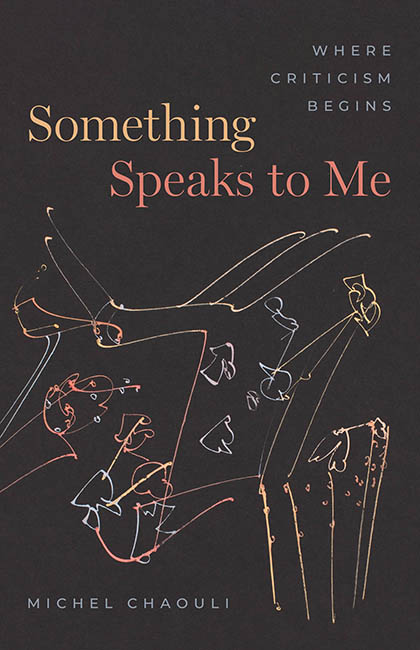Critical Inquiry Critical Inquiry
Michel Chaouli. Something Speaks to Me: Where Criticism Begins. Chicago: University of Chicago Press, 2024. 167 pp.
Review by Vedant Srinivas
17 April 2025
Taking an oft-repeated class on Franz Kafka’s The Trial (1925), Michel Chaouli discovers, much to his astonishment, that he has nothing to say about it. This then is what prompts the writing of this book, an experience best captured in the following lines:
Something speaks to me.
I must tell you about it.
But I don’t know how. [p. 3]
Part 1 of the book elaborates on the giddying experience of being drawn to a work of art. Drawing on passages by writers such as Roland Barthes, James Baldwin, and Susan Sontag, Chaouli claims that there is something in these works that discloses the world in a new way. To hear their call is to become “vulnerable to its significance,” to learn “how to hear them and move with them” (pp. 21, 34).
In the second part of the book, Chaouli shifts his attention to what compels us to respond to particular works of art. One encounters here a deft reversal of the criticism process: rather than my having something to say about the work, it is the work that urgently says something about me, indeed reveals something about me. “As I stutter my way into it, I take part in The Trial. I make sense of it and, making sense, make it part of my life” (p. 53). It is precisely such a manner of criticism that Chaouli refers to as poetic criticism. For Chaouli, poetic criticism is a form of comportment or an ethos, a way of doing or making something new that is urgently prompted by something old.
This prompting always carries with it a sense of opacity, something that Chaouli takes up in Part 3. Opacity is that which exceeds my known capacities, that which is too much for me. Once again, Chaouli draws on a host of thinkers to argue that what makes a work of art—and conversely criticism—poetic is not its striving for mastery or meaning but rather its being mired in opacity. It is an upheaval of experience that makes me lose my bearings—“the nonhuman lurking in the human being”—and activates new intensities and modes of experience (p. 113).
Chaouli’s book succeeds in enacting what it enunciates: it is not so much a systematized code of poetic criticism but rather a direct encounter with thinking itself, with thought as it is spontaneously being formed. This inevitably comes with its own drawbacks: there are times when the writing seems to belabor the point (the discussion of tact in part 2), but it is more than offset by the highs that the book achieves, where one experiences something of the vivacity of language and the world. This, in some ways, is the point: the poetic after all is dormant not just in “every act of criticism but also in every human act; the question is just whether it is permitted to stir to life” (p. 123).

